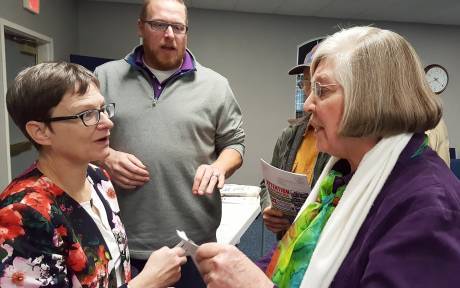
Updating the Town of Batavia’s Comprehensive Plan that will guide its decisions on zoning, capital improvements and budgeting has turned into a balancing act – a lengthy process that pits the desire to promote commercial development against the need to protect its valuable natural resources.
That was the viewpoint of Town Engineer Steven Mountain as he spoke to about 25 people who attended a public informational meeting on Wednesday night at Town Hall on West Main Street Road.
Mountain, responding to an impassioned plea by town resident Mary Martha Webster to keep the “rural” feel of the community, said town officials – in conjunction with independent environmental planners – are “trying to take a harder look at that (preserving natural resources and the land).”
“The development pressure is there; we’re trying to balance it,” Mountain said. “This is really the first time we’ve taken that approach.”
Webster apparently took exception to a segment of the presentation by Barbara Johnston of LaBella Associates Inc., a Rochester engineering, planning and consulting firm, who has been assisting the Town in its Comprehensive Plan update and with the Green Genesee/Smart Genesee initiative – the latter a grant-funded scientific approach that connects the natural environment and business growth.
“All I have heard is development, development. I moved to a rural area. This is not what I want, this is what you want, Greg,” Webster said, directing her comments to Town Supervisor Gregory Post. “You’re making the Town of Batavia into the City of Batavia.”
Following Mountain’s response, Johnston added that the team charged with updating the Comprehensive Plan is “trying to build it with a natural resource base and agricultural base.”
Daniel Lang, the Town’s code enforcement officer, said the goal is not to expand the amount of land available for commercial development but to “place stricter guidelines for developers (by) looking at consequences to natural resources.”
“We will be setting more limitations … criteria (that developers would have to follow) that would be sent to the planning board for complete review,” he added. “It will add an extra step of protection for the environment … and will keep it rural.”
Mountain agreed, stating that the Town “wants to be on the forefront, (able) to dictate to developers that if you want to come here, you will build to these standards.”
Johnston, in her PowerPoint presentation, explained that the Comprehensive Plan -- a blueprint for zoning and code design for the next 15 years or more -- addresses key issues such as land use, natural resources, agriculture and farmland, parks and recreation, housing and residential neighborhoods, business and economic development, transportation and energy, and government services and budgeting.
The Comprehensive Plan team, which also includes Sheila Hess of CC Environment & Planning, of East Bethany, and Matt Ingalls of Ingalls Planning & Design, of Fairport, has reviewed existing studies in these areas, and has set the following goal: Balancing natural, agricultural and rural landscapes with residential, commercial, industrial and institutional development.
“The keystone of the entire plan in general is the land use map (which defines the different zones and shows areas that are best suited for development),” Johnston said.
She noted that their research has led to a projection that the Town has another 1.5 million square feet of land that lends itself well to future development (currently 2.7 million square feet has been developed in that manner). She also said their model calls for an additional 500 or so housing units.
The Comprehensive Plan committee also is analyzing the Town’s budget, Johnston said, to gauge the plan’s financial impact. She showed a slide that revealed that 62 percent of the Town’s revenue is derived from taxes paid by homeowners.
Post said he expects that number to decrease in a couple years when some of the payment-in-lieu-of-taxes (PILOTS) granted to large commercial ventures start to come off the books, and those businesses begin to pay more in taxes.
All involved stated that Wednesday’s meeting is a step in the process, which could go on for another few months.
A public hearing is scheduled for 7 p.m. Dec. 21 at Town Hall. Depending upon the feedback, changes could be made, pushing the plan’s adoption to the spring.
“This is not the first or the last of these meetings and this is not a slam dunk,” Post said. “But if you don’t have a plan, change occurs anyway. It’s our kids and our grandkids that we’re looking out for.”
Photo -- Barbara Johnston, left, and Daniel Lang address some of Mary Martha Webster's concerns following Wednesday night's Comprehensive Plan Update presentation at Batavia Town Hall. Photo by Mike Pettinella.

“You’re making the Town of
“You’re making the Town of Batavia into the City of Batavia.” Oh the horror!
With the City of Batavia
With the City of Batavia being land locked, I understand that the Town of Batavia will expand. But I believe that many of us who live in the Town want caution to be exercised. That's not too much to ask. A few more months & a few more public hearings won't hurt.....or is there an agenda we don't know about?